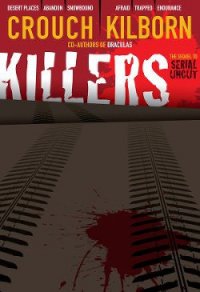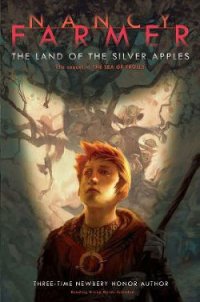The Sea of Trolls - Farmer Nancy (читать книги бесплатно полностью без регистрации сокращений .txt) 📗
“In doing so, they lost the ability to understand it. They could no longer merge themselves thoughtlessly like the animals. And this cut them off from a great joy. They felt as if their lives were dull and meaningless. A few people tried to tear down the wall, but they were no longer able to endure such reality. Did you ever hear of the Valley of Lunatics?”
Jack pushed himself away from the rowan tree. Without quite realizing how he’d got there, he had found himself leaning against it in a quiet daze.
“Come on, get moving,” cried the Bard. “Things are worse than I thought.” He pulled Jack into the meadow and whirled him around. “Jump! Run! Do handstands!” he ordered. And so Jack danced and cavorted around the meadow, feeling silly and exhilarated at the same time. His mind seemed to clear. The heavy air of the valley freshened. Finally, he threw himself to the grass, laughing and panting.
“That’s more like it,” said the Bard with his hands on his bony hips.
“Where’s this Valley of Lunatics?” Jack asked.
“In Ireland.” The Bard lowered himself carefully to the grass. The boy could almost hear his bones creak.
“That’s on the other side of the world,” said Jack.
“Not really. You could reach it in a few weeks.”
“Father says the Irish walk upside down and have eyes in their feet,” said Jack.
“Your father—don’t get me distracted, lad. The monks told him that as a joke. Half of themare Irish. The Valley of Lunatics is real, though.” The old man flexed his fingers, and Jack heard his joints pop. “My best friend and I trained as bards in Ireland. We studied for many years before we were trusted with the secret knowledge of the life force. We were taken to a place where it pooled under the earth. That’s where its strength is greatest. Day after day we sat, struggling to open our minds to its power. And just as quickly retreating when it got too close. The minute we felt it taking over, we had to get up and run around.”
“Is that why you had me do handstands?” said Jack.
“Exactly. It puts you back in your body, keeps you from being overwhelmed. But my friend liked the feeling of power.” The Bard sighed and fell silent for several minutes. Jack found himself growing drowsy again.
“Move around if you have to,” said the Bard. So Jack did a few somersaults and finished up by walking on his hands, as he’d seen a jester do at a village fair.
“You see, whatever power a bard has,” the old man continued, “comes from the life force: his music, his ability to hold an audience, his skill in calling up storms.”
Jack straightened up. That last one sounded interesting.
“It takes years to control it, and my friend didn’t want to wait. He refused to stop while it was still safe. At first he was successful. He could cause a fire to hang in midair or birds to fly upside down. But one day—while he was trying to make a forest pull up its roots and walk—something went snap.I could actually hear it. He fell over. A second later he sprang up and his body shook as though a giant dog had him in its jaws. Then he gave a mighty howl and ran off as fast as he could go.”
Jack was horrified. The Bard had said hisdefenses were gone. Was it his fate to go mad as well?
“I followed him,” said the old man. “It wasn’t easy, for I had to stop at nightfall and go around bramble bushes and streams. My poor friend went straight ahead no matter what was in his way. I found pieces of his clothing on thorns. At last I came to the Valley of Lunatics.”
A mist had blown up from the sea, and the air was beginning to chill. The bees had left their feeding. Each moment there were fewer of them as they sped off to their warm hives.
“I could hear them cackling before I could see them,” said the Bard. “It was a terrible sound, so like laughter and yet so completely joyless. All the failed bards in Ireland had found their way to this one place where the life force was stronger than anywhere else. And there they stayed. I saw my friend, but he was nothing like the man I’d known. His eyes and hair were wild. He was in the grip of a power far beyond him, and I, poor apprentice that I was, had no way to free him.”
The old man climbed to his feet and held out his hand. “Let us not dwell on the unhappy past. I may have done you harm, but I’m no longer a raw apprentice. I can help you. And perhaps it was all for the best. Dangers sweep upon us. Storm clouds are gathering. Swords are being forged….” Muttering to himself, the Bard made his way up the path.
Jack followed him. He felt somewhat dazed. The sleepiness that had come upon him earlier was creeping back, but the farther they got from the little valley, the better he felt. And by the time they reached the Roman house on its windswept cliff, he was fine.
Chapter Five
HROTHGAR’S GOLDEN HALL
Moons waxed and waned over the little village. The apples on Father’s trees turned golden. Grain bent in waves before the west wind, and presently, harvest time arrived. Sheep were shorn, honey was taken from the hives, pigs were slaughtered in preparation for winter. Jack stayed in the Roman house. He couldn’t hear the killing of the pigs, but he could feel it. The air trembled with their deaths.
All the while he practiced magic with the Bard. He learned to call up mist, make apples drop from a high branch, and call birds down from the sky. It was small stuff, but it delighted him.
Then it was winter. Snow settled over the high hills. The sea turned dark and the sun fled. Jack stayed indoors and memorized poems. The Bard had made him a small harp, but the cold was so intense, Jack’s fingers were clumsy on the strings. The old man decided it was time to teach the making of fires. “Concentrate on heat,” he said, sitting across from a jumble of sticks and straw.
“I’m freezing,” said Jack. The Bard had put out the fire at dawn, and the air was so cold, it was frightening. Ice rimed the paintings on the walls.
“It’s only freezing if you think it is,” the Bard said.
That’s all right for you,Jack thought resentfully. You’ve got a thick woolen cloak and fur-lined boots. I’ve only got this miserable tunic.
“If I’ve told you once, I’ve told you a hundred times.” The old man sighed. “Don’t use anger to reach the life force.”
How does he know what I’m thinking?thought Jack. Anyhow, it’s true. I’ve outgrown my tunic, and my shoes have been through so much mud, you could bake them like pots.
“Anger belongs to death,” said the Bard. “It turns on you when you least expect it.”
Jack, with an inward sigh, thought about the hot sun pouring down last summer. Rain fell on the earth and flowed out of hillsides months later. Surely light remained trapped as well. He searched for it, going deep into the soil, beyond the nests of mice and voles, beyond even the gnarled roots of the forest, until he came to rock. And beyond the rock he found heat. He saw a faint glow in his mind and drew it forth. He called to it, mentally held out his hands to it.
Jack felt sick. Magic sometimes did that to him. The power roiled in the pit of his stomach, and he thought he was going to throw up. He opened his eyes to see a thread of smoke curling up from the straw.
“Don’t give up now,” said the Bard. “Keep calling it. Keep calling.” But the nausea won out. Jack stumbled to the door, and when he returned, the spark had died.
“Don’t worry,” the Bard said cheerfully. “What’s done once can be done again. We have all day.”
So we do,thought Jack as the north wind buffeted the walls of the house.
“If you feel sleepy, walk around,” said the Bard.
I’m not sleepy, I’m cold,thought Jack. But he found he was sleepy after all. It would feel so nice to give himself up to the sensation. He could almost see the frost giants calling to him. Lie down, boy,they said. It’s a fine old bed, ice is. Nothing like snow for a cover either.




